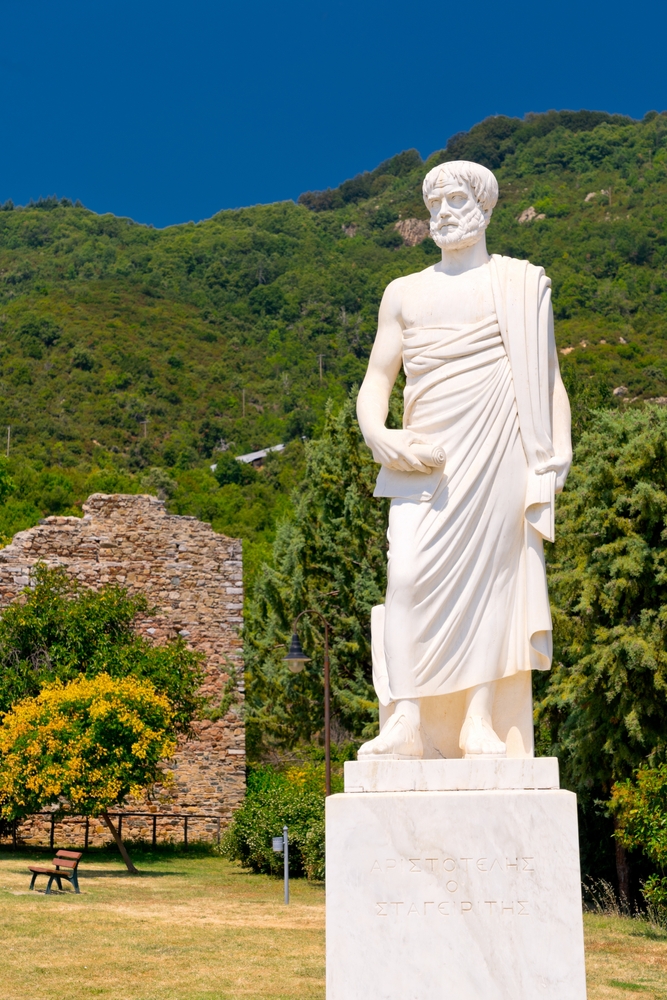Aristotle's "Poetics" is a foundational work in the history of literary criticism and aesthetics. In this work, Aristotle explores the nature of tragedy and the principles that underlie it. In this article, we will explore some of the key ideas and themes of "Poetics" and examine their relevance to contemporary debates in literary criticism and aesthetics.

 Aristotle (384-322 BCE) was a Greek philosopher and scientist who is considered one of the most important figures in Western thought. He was a student of Plato and tutored Alexander the Great. Aristotle is known for his wide-ranging contributions to philosophy, including works on ethics, politics, metaphysics, logic, biology, and physics.
Aristotle (384-322 BCE) was a Greek philosopher and scientist who is considered one of the most important figures in Western thought. He was a student of Plato and tutored Alexander the Great. Aristotle is known for his wide-ranging contributions to philosophy, including works on ethics, politics, metaphysics, logic, biology, and physics.
Aristotle was born in Stagira, Greece, and was the son of a physician. He studied at Plato's Academy in Athens for 20 years, but later broke up with his teacher and founded his own school, the Lyceum. The Lyceum was a center of learning that attracted scholars and thinkers from all over the world.
Aristotle's contributions to philosophy and science were vast and diverse. He developed a system of logic that became the basis for Western philosophy and science, and his ideas about ethics, politics, and metaphysics have had a profound and lasting impact on Western thought. In addition, Aristotle made important contributions to biology, including his studies of animals and his classification system that influenced the work of naturalists for centuries.
After the death of Alexander the Great, Aristotle's fortunes declined. He was charged with impiety, and although he fled to Chalcis, he died the following year. Nevertheless, his ideas continued to influence the development of Western thought for centuries to come, and he remains one of the most important figures in the history of philosophy and science.
Aristotle is one of the most important figures in Western philosophy, and his works have had a profound and lasting impact on the development of philosophy, science, and politics. Here are some of his most important works:
-
"Nicomachean Ethics": This work is considered one of Aristotle's most important and enduring works, and it explores the nature of happiness, the virtues, and the relationship between ethics and politics.
-
"Politics": This work examines the nature of the state, the ideal form of government, and the role of the citizen in political life. It is also one of the earliest works of political science.
-
"Metaphysics": This work explores the fundamental principles of reality, including the nature of being, causality, and substance. It is one of the most important works of metaphysics in Western philosophy.
-
"Physics": This work is a foundational text in the development of Western science, and it explores the nature of motion, space, time, and matter.
-
"On the Soul": This work examines the nature of the soul and its relationship to the body, and it is an important work in the development of psychology and cognitive science.
-
"Poetics": This work examines the nature of drama and literature, and it has had a lasting impact on the development of literary theory and criticism.
Overall, Aristotle's works cover a wide range of topics and have had a significant impact on the development of philosophy, science, and politics, making him one of the most important figures in the history of Western thought.
Aristotle's "Physics" is a foundational work in the history of natural philosophy and science. In this work, Aristotle explores the fundamental principles of the natural world and the principles that govern the behavior of physical objects. In this article, we will explore some of the key ideas and themes of "Physics" and examine their relevance to contemporary debates in physics and philosophy.
Aristotle's "On the Soul" is a foundational work in the history of psychology and philosophy. In this work, Aristotle explores the nature of the soul and its relationship to the body. In this article, we will explore some of the key ideas and themes of "On the Soul" and examine their relevance to contemporary debates in psychology and philosophy.
Aristotle's "Metaphysics" is one of the most influential works in Western philosophy. It is a comprehensive examination of the nature of reality and the principles that underlie the universe. In this article, we will explore some of the key ideas and themes of "Metaphysics" and examine their relevance to contemporary debates in metaphysics and philosophy.
Aristotle's "Politics" is a seminal work in Western political philosophy that explores the nature of politics and the ideal state. The work is divided into eight books, with each book building on the ideas and concepts presented in the preceding books. The work begins with a discussion of the nature of the state and the different types of government and ends with a discussion of the role of the individual in politics.
